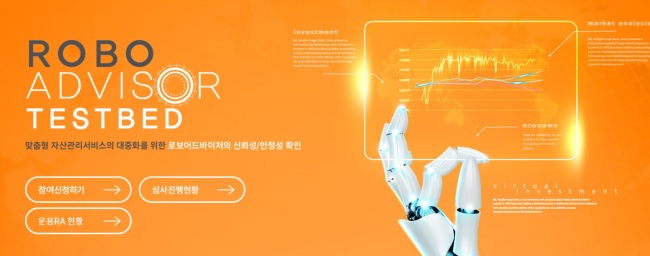[Feature] Tough rules curb adoption of robo advisers
By Korea HeraldPublished : Oct. 20, 2016 - 15:40
When 36-year-old office worker Kim wanted to switch her 5 million won ($4,400) bank savings to a better yielding investment vehicle, the first thing that came to mind was a low-cost robo-adviser that could manage her money with an automated asset allocating algorithm.
For the tech-savvy and busy Seoulite, an automated financial adviser, or “robo-adviser,” sounded appealing in that the advice cuts out human emotions in unexpected events, requires just a minimum account of 5 million won and costs one third or half less than traditional financial advice.
For the tech-savvy and busy Seoulite, an automated financial adviser, or “robo-adviser,” sounded appealing in that the advice cuts out human emotions in unexpected events, requires just a minimum account of 5 million won and costs one third or half less than traditional financial advice.

While navigating which online products were available, however, she learned she was still required to visit a human adviser at a financial institution to listen to a full explanation of such automated products’ risks and expected returns before signing a contract to entrust her lump-sum of money.
“I can’t carve out time during my busy weekdays to visit a brokerage. It’s silly that I can’t buy robo products online,” Kim, who only wished to be identified by her surname, told The Korea Herald.
“I thought I could just set up my account on my mobile phone, choose a robo-adviser and see the results in six months or a year later.”
Currently in South Korea, fully unmanned robo-adviser services are not available due to strict regulations by the Financial Services Commission.
Just last month, the FSC reconfirmed its earlier stance that it would not allow financial institutions to provide full-fledged online robo services because of “concerns about the trustworthiness and stability of robo-advisers.”

The FSC said it would identify reliable investment algorithms by robo companies or financiers after six months of test runs. Even after passing the test, an unmanned survey on investor’s risk tolerance will still not be permitted at least until April next year, the FSC said.
The decision was a major blow to mobile asset management service provider Dunamu Investment Management.
“We’ve been waiting for the approval of unmanned discretionary investment contracts for so long. It was somewhat disappointing for a company like us,” said James Oh, CEO of Dunamu Investment Management, a subsidiary of financial technology startup Dunamu.
The company launched a mobile app called MAP, or Managed Account by Professional, Wednesday last week in partnership with Kakao Stock and 11 local financial advisory services companies, including Samsung Asset Management and HANgaram Investment Management.
The idea is to attract smartphone-glued Koreans in their 30s and 40s, and encourage them to invest in low-cost exchange-traded funds, or ETFs, with minimum accounts of just 500,000 won via smartphone. The fee is set at 0.5-1.5 percent, depending on the advisory company.
Due to the human intervention rule, the company has to spend extra money to operate a sales division and dispatch human advisers to customers when clinching individual contracts, Oh explained.
“I hope the regulation (banning unmanned contracts) can be lifted as soon as possible so that Korea, where IT infrastructure is excellent and people have so much financial knowledge, can truly advance,” he said.
In the advanced US financial market, robo pioneers such as Betterment and Wealthfront provide fully online robo-advisory services, ranging from surveys to analyze investors’ risk tolerance to investment suggestions to the rebalancing of assets and reporting investment results.
Korea’s tough rules have discouraged some financial institutions from participation in government-led robo test runs.
Six brokerages, five commercial banks, six advisory companies and 17 robo developers have applied their self-developed or borrowed algorithms to be tested for commercialization, but KEB Hana Bank is one leading institution that has decided not to join so far.
“In the market, people say participating in the test bed doesn’t produce any actual benefit. But they can’t say it out loud because of the government being behind the move,” an industry source said.
David Chang, vice president of Quarterback Investments, a pioneer in the local robo-asset management market with the first robo product launched in March, shared a similar view.
“Just passing the test doesn’t mean that the robo market will explosively grow. It just means greater credibility and safety of robo services,” Chang said.
Despite strict regulations, people are increasingly interested in robo products, Chang noted.
According to Chang, assets managed at brokerages and banks using Quarterback’s big data-based algorithm jumped to the current 100 billion won from 10 billion won in May, when the company began providing robo services.
“The size of the market is surely growing. It is just that the regulation has to be phased out for unmanned contracts,” he said.
Kim Jeong-beom, head of Mirae Asset Securities’ financial product team, said the brokerage sold a total of 5 billion won in asset accounts to date since launching the robo service in March in collaboration with four robo advisory services firms -- Quarterback, Value System, December & Company and Summit International Capital.
A customer normally inputs 7 million-8 million won per robo-based account and yields vary from 0.1 percent to 5.5 percent in six months, depending on the advisory firm and market conditions.
Analyst Gilbert Choi at NH Investment & Securities said local financial companies are expected to switch their customer target from youngsters with low assets to older people.
“They say they target young Koreans for robo services, but I don’t think they have enough money to invest in such lump-sum amounts. The target will be changed to those in their 50-60s who are interested in online investment and pension plans,” Choi said.
Choi compared robo-advisers to the introduction of new automated cars when people were still more comfortable with manual gears.
“They are new and unstable. People still think traditional investment is more reliable for now,” he said.
By Kim Yoon-mi (yoonmi@heraldcorp.com)
-
Articles by Korea Herald








![[Graphic News] More Koreans say they plan long-distance trips this year](http://res.heraldm.com/phpwas/restmb_idxmake.php?idx=644&simg=/content/image/2024/04/17/20240417050828_0.gif&u=)
![[KH Explains] Hyundai's full hybrid edge to pay off amid slow transition to pure EVs](http://res.heraldm.com/phpwas/restmb_idxmake.php?idx=644&simg=/content/image/2024/04/18/20240418050645_0.jpg&u=20240419100350)






![[From the Scene] Monks, Buddhists hail return of remains of Buddhas](http://res.heraldm.com/phpwas/restmb_idxmake.php?idx=652&simg=/content/image/2024/04/19/20240419050617_0.jpg&u=20240419175937)

![[KH Explains] Hyundai's full hybrid edge to pay off amid slow transition to pure EVs](http://res.heraldm.com/phpwas/restmb_idxmake.php?idx=652&simg=/content/image/2024/04/18/20240418050645_0.jpg&u=20240419100350)

![[Today’s K-pop] Illit drops debut single remix](http://res.heraldm.com/phpwas/restmb_idxmake.php?idx=642&simg=/content/image/2024/04/19/20240419050612_0.jpg&u=)